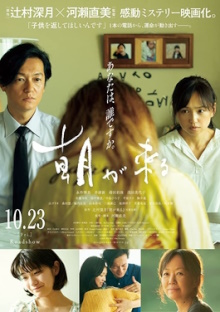This was adapted from a novel and that usually means a denser, richer film. It’s certainly long but I didn’t find it especially rich or insightful. It’s a beautifully shot film, somewhat anime-style in its aesthetics even, and director Naomi Kawase gets al of the basic building blocks of her craft right so it manages to convey plenty of emotion. Yet it’s also a film that plays things completely safe and breaks no new ground whatsoever. This means that I had no difficulty enjoying myself while watching it but at the end I found myself asking: just why?
Housewife Satoko receives a phone call from her son Asato’s kindergarten. The teachers claim that Asato pushed another boy off the jungle gym and injured him. The film then flashes back to the relationship between Satoko and her husband Kiyokazu, revealing that the happy couple were unable to have children of their own due to her husband’s aspermia. After a long period of unsuccessful treatments, they resort to Baby Baton, an organization that matches childless couples with girls who have unwanted pregnancies. They are matched with Hikari, a fourteen-year-old junior high school student pregnant from a romance with a fellow student. The couple chooses to meet with Hikari when they are given custody of the infant Asato and the young girl sincerely thanks them for taking care of her baby. Another flashback reveals Hikari’s past and how she foolishly fell in love with another boy in her school like so many other girls before her. The adoption seemingly goes well yet Hikari’s life after she gives up her baby doesn’t go smoothly and one day Satoko receives a phone call from someone claiming to be Hikari who wants her son back.
This is a rather heavy subject matter and the film chooses to use a delicate, sweet approach. It’s hard to find fault after all when Satoko and Kiyokazu are pretty much model parents and Satoko even handles the issue of Asato seemingly hurting another boy with aplomb. Plus Asami who founded and runs Baby Baton is such an angel who treats all of the girls with respect and love, though many are sex workers. Yet drill down deeper and you can see how the entire film is suffused with a harsh brand of conservatism. The only reason to include the episode about Asato possibly hurting another boy is to raise doubt about whether the fact that he was adopted might mean that he has a violent streak. In the end, the film doesn’t go there, but then why play with the issue at all? Similarly it wants to toy with the audience over whether or not the girl who calls Satoko and asks for her baby back is really Hikari. Without that twist, the film would have very little drama or tension but it’s a cheap, pointless artifice and adds nothing of value at all.
The film is exceptionally unkind towards Hikari, making her a victim over and over again. She’s introduced as the stereotypical anime girlfriend, complete with scenes of falling autumn leaves and crossing a bridge on a bicycle. She foolishly believes in the lust-driven promises of a boy and that one single decision ruins her entire life. As a Yakuza gangster remarks to her later, she only has herself to blame for being stupid. Through it all, she remains graceful, kind and most of all, beautiful. It’s an ideal of Asian femininity that is nauseating in elevating passivity and naivety into virtues. As my wife notes, giving up Asato for adoption unequivocally is the best outcome for all parties concerned yet the film is intent on punishing Hikari both for getting pregnant and for giving it up. She just can’t win either way. It’s emblematic of a very conservative and morally uptight mindset that feels like something out of the 1980s.
The thing is the scenes are so well made and the film is so long that it’s not obvious at first that this is what the director is going for. It feels odd to our sensibilities how diffident Satoko and her husband are to each other but otherwise it seems like a conventional and inoffensive drama. Towards the end however, I grew disgusted by how badly it judges the character of Hikari and in fact the more I stopped to think about it, the worse the film looks to me. If anything, the moral takeaway from Hikari’s story should be that sex education is essential from a young age and the Scandinavian convention of separating sex from love makes so much sense. Somehow I can’t see the director Kawase agreeing with this conclusion at all.
